Learnings from the 2025 NABSA Conference in Montreal
by Odochi Akwani, Writer and Content Manager
October 30, 2025
The shared micromobility industry met in Montreal, Quebec, to gather, learn, and define the future of shared micromobility together.
The annual North American Bikeshare and Scootershare Association (NABSA) conference convened in Montreal, Quebec, from October 15-17, hosted by BIXI Montréal. Centered around this year’s theme — Momentum: The Power of Shared Micromobility — attendees engaged with and learned from colleagues through breakout sessions, keynote presentations, and mobile workshops. The conference concluded with a deep dive into BIXI’s operations with a warehouse tour and closing social.
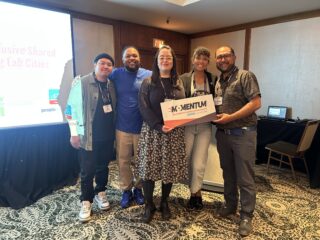
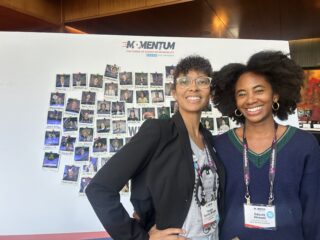
The first day was spent getting to know other NABSA members during the Lightning Round Slideshow and exploring the city of Montreal through mobile workshops. I attended the “From Cobblestones to Modern Streets: Montreal’s Living History by Bike” mobile workshop exploring the historic Old Port neighborhood and The Plateau, an artistic neighborhood. We also stopped by a Skyhook Solar station, a solar-powered charging station, and learned how it has reduced BIXI operational costs. Tangier Barnes Wright, deputy director of shared micromobility at PeopleForBikes, enjoyed the “Cycling the Green City: Montreal’s Urban Bike Network” mobile workshop, where she noted how comfortable she felt riding in the protected bike lane network and how bustling it was with bicyclists.
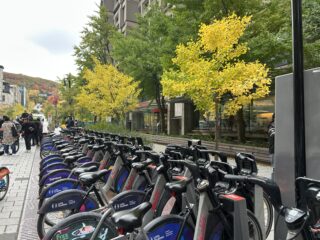
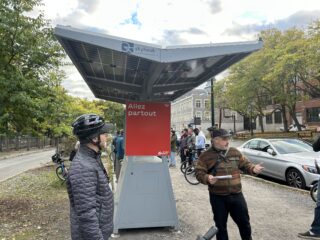
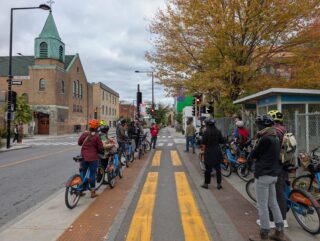
The conference officially opened with a land acknowledgement video presentation from McGill University students, followed by the keynote speaker, Montreal Mayor Valérie Plante. We put together our top six key takeaways from this year’s conference.
1. Transportation Options Open Up Housing Opportunities
Mayor Plante underscored the importance of improving territorial equity in neighborhoods outside of downtown cores. She highlighted the work BIXI has done in developing a bike share network that reaches all 19 boroughs of Montreal, as well as 12 other cities. This expansion went in tandem with the development of Montreal’s cycling highway to combat road deaths and injuries and better connect the city through these 17 routes. Plante shared that the mode shift to cycling increased from 6% to 11% in the last five years. She encouraged the audience to think of how people will feel connected to transit options. There’s an opportunity to create housing options alongside transit since people have a way to get to work and their day-to-day activities.
2. Build Workplaces That Prioritize Wellbeing, Connection, and Long-term Sustainability
In the session “Living the Mission: Caring for the People Behind Shared Micromobility,” we heard from operators, advocates, and agencies of varying sizes about how they are building workplace cultures that prioritize wellbeing, connection, and long-term sustainability. We heard from Kristin Gavin, CEO at Bicycle Transit Systems, about the success of their four-day work week. If a national bike share operator can do it, so can you. When you provide the freedom and flexibility for people to live their lives, they work harder and happier. Consider partnering with local community-based organizations to increase diverse candidates when hiring. Infuse radical transparency practices, making space at staff meetings for personal check-ins and to discuss issues negatively impacting staff and their communities.
Bixi’s bike mechanic work is handled by the nonprofit organization CycloChrome. CycloChrome “trains youth in bike mechanics and accompanies them in their career development to promote their socio-professional integration.” Mathieu Forget, compliance manager and technical editor at CycloChrome, shared how education is a core operational value of their organization. They give students a financial incentive to go to class. Additionally, social workers are on-site to work with employees and encourage their success in both their personal and professional lives.
3. Invest in Trusted Community Messengers
This is something BBSP emphasizes again and again. The notion of “build it and they will come” isn’t good enough. Community engagement must be part of the equation. Stephanie Ridgeway, Indego’s community engagement coordinator, highlighted this in the session, “Beyond the Discount: Designing Micromobility Systems That Work for Everyone.” Indego pays community ambassadors in its service area and expansion zones to connect their neighbors to the benefits of bike share. She shared that for some people, when a station shows up in their neighborhood, their mind immediately goes to gentrification, and the understanding that bike share is for new folks coming into their neighborhood. Community ambassadors who live in their neighborhoods help residents see that bike share is a tool for them. “You can pass out 200 promo codes for free bike share and get no redemptions,” says Ridgeway. “That’s the importance of community engagement.”
4. Equity In Shared Micromobility is Ongoing And Takes Intention
Professor Lawrence T. Brown describes Baltimore as a city divided into a “Black Butterfly” and “White L” due to historic racial redlining that left a legacy of segregation. This created a division of race and income, as well as public health concerns related to lead paint spread, hazmat proximity, and access to transportation. Tyler Smith, dockless vehicle program manager for the Baltimore City Department of Transportation, shared how the city made a concerted effort in 2019 to change that inequity in access for its shared micromobility network. By 2024, the “White L” was nonexistent. Baltimore did this, in part, through its 2023 BBSP mini-grant project. They identified equity zones and placed certain requirements, including requiring a specific number of dockless vehicles to be available every morning, and raised awareness about its equity program, where Smith shared that “20% of the city is eligible for 80% off of fares.”

5. Envision a Different Future
In his keynote speech, Charles T. Brown, founder of Equitable Cities, an urban planning, public policy, and research firm working at the intersection of transportation, health, and equity, clarified how equity is not about exclusion. It leads to racial equity, meaning an increase in access to power for those often left out of decisions made for them. Brown shared that through his findings, he heard from Black and Brown communities that they worry that planners envision a future that doesn’t include them, within the neighborhoods they grew up in. He also highlighted how Black people are 70% more likely to be killed by motor vehicles, yet infrastructure investment hasn’t followed where people are being harmed.
6. Everyone Should Be a Customer Service Expert
In the session, “Ride for All: Lessons in Inclusive Shared Micromobility from Living Lab Cities,” Meghan Alvarez, transportation engagement coordinator at the City of Philadelphia’s Office of Transportation, emphasized that everyone, regardless of specific role, should be able to share with folks about how to use the system. It may sound like a given, but engagement coordinators, operations team members, communications managers, and city planners alike should be able to walk someone through the process of signing up for a pass, be aware of current membership options, and the pricing structure.
Barnes Wright shares that what is clear from attending the conference year after year is that the shared micromobility industry attracts a unique and passionate set of people. People who value community, livable cities, innovation, safe streets, justice, and equity. BBSP is proud to be a part of this family of people and have helped build this family. A family that values the role of biking in creating community, love, and relationships. We value the experiences and lives of people who bike and scoot and recognize that many people who are carrying out the critical outreach and engagement work are being forced to reconsider their in-person strategies at this moment.
___________________________________________________________________________________________
The Better Bike Share Partnership is funded by The JPB Foundation as a collaboration between the City of Philadelphia, the National Association of City Transportation Officials (NACTO), and the PeopleForBikes Foundation to build equitable and replicable bike share systems. Follow us on LinkedIn, Facebook, Twitter, and Instagram, or sign up for our weekly newsletter.
Have a question or a story idea? Email odochi@peopleforbikes.org.
